June 17, 2025 | 11:05 GMT +7
June 17, 2025 | 11:05 GMT +7
Hotline: 0913.378.918
June 17, 2025 | 11:05 GMT +7
Hotline: 0913.378.918
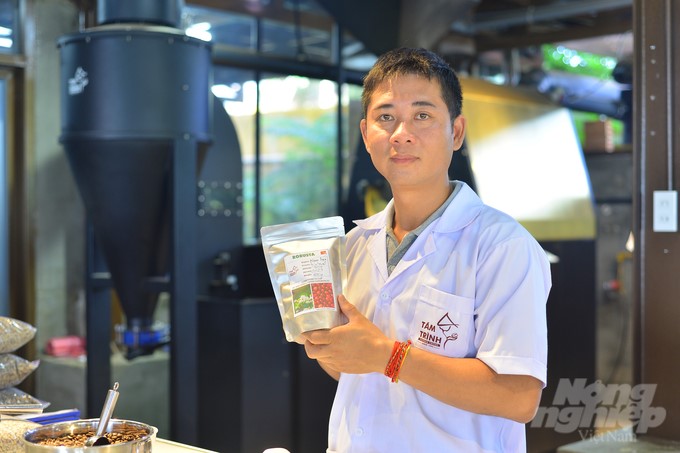
Tam Trinh Coffee has linked with more than 3,000 coffee farmer households to build and develop a sustainable coffee model throughout Lam Dong province. Photo: Minh Hau.
Ms. Nguyen Thi Tam, Director of Tam Trinh Coffee Import-Export Company (a coffee production unit with the Tam Trinh Coffee brand in Gia Lam commune, Lam Ha district, Lam Dong, comes from a small household buying coffee for processing), has been passionate about coffee since 1995. During a visit to Ho Chi Minh City, she experienced a cup of pure coffee at Starbucks Coffee.
She realized that the taste of pure coffee is inherently delicious. A roasting process according to the correct procedure will bring the characteristic flavor of coffee instead of having to mix additional raw materials during the roasting process to make coffee more fragrant.
This prompted Ms. Tam's family to seek out experts and coffee processing centers to learn from their experiences and find solutions to produce quality coffee beans, right from the stage of selecting seedlings and techniques to the stage of harvesting and processing.
Overcoming many ups and downs with coffee, in 2012, Tam Trinh Coffee Import-Export Company with the Tam Trinh Coffee brand was officially established.
In 2015, facing the wave of high-quality coffee favored in the world market and seeing this as an opportunity for development, Tam Trinh Coffee pioneered building a high-quality coffee production model according to the close process of the "Farm to Cup" model (production model from farm to cup of coffee), which helps increase the value of coffee beans and bring high-quality processed coffee products to domestic and international consumers.
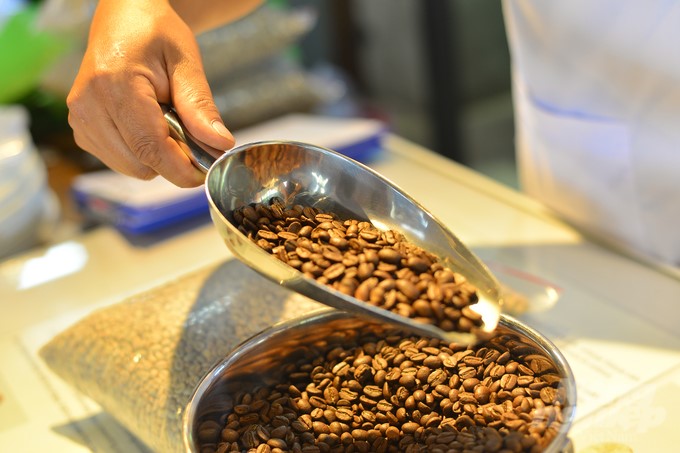
Tam Trinh Coffee brings Vietnamese consumers the freshest coffee products. Photo: Minh Hau.
After learning from experts in the coffee industry, Tam Trinh Coffee began making its own batches of high-quality coffee, following the processes of advanced countries around the world. The product is consumed at the family's store system in Ho Chi Minh City and receives positive reviews from consumers, creating a premise for exporting high-quality coffee to the world market.
To get high-quality coffee beans, building raw material sources is a particularly important factor. Tam Trinh Coffee focuses on developing raw material areas and strictly controlling quality to ensure quality right from the stage of selecting seedlings and farming techniques.
During the production process, farmers in the production linkage are transferred and applied a coffee production model according to a sustainable and organic direction, which uses organic fertilizers without the use of pesticides and attracts natural enemies to prevent pests according to the 4C standards of the World Coffee Association. Of which, more than 500 households were selected to produce high-quality coffee.
Mr. Mai Ngoc Dinh, in charge of production and quality of sustainable coffee chain at Tam Trinh Coffee Import-Export Company, said: "With the desire to control quality right from the raw material area, we have built a close relationship with farmers, linked with more than 500 farmer households in Lam Dong to ensure the quality of raw coffee right from the stage of selecting seedlings and applying sustainable organic farming processes, contributing to an increase of 10–30% in farmers’ income.
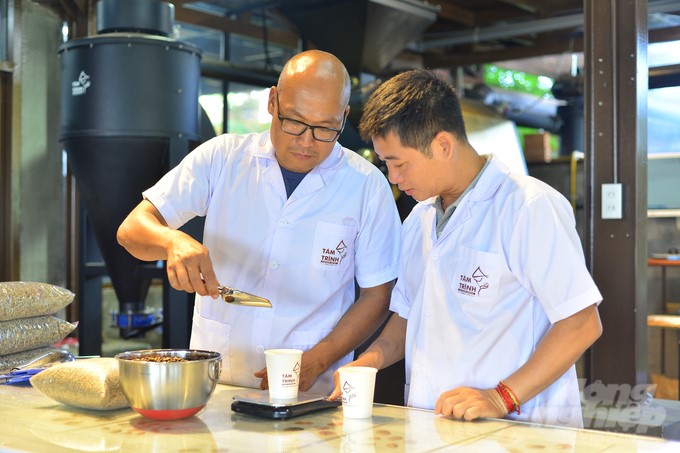
Before being imported into the factory, coffee must always go through a thorough and transparent quality inspection process. Photo: Minh Hau.
Every year, farmers in the production linkage with the company are participated in training classes on growing and harvesting techniques and improving skills in sustainable coffee farming. Thereby helping farmers master production knowledge and produce quality coffee beans.
Besides, farmers are encouraged to strictly follow the production process to ensure coffee quality by adding a price bonus of 5,000–10,000 VND/kg compared to the market price when the company purchases coffee, ensuring a stable price and output for people in the area. Thus, farmers feel secure in production and expanding the scale of coffee gardens. Thanks to increasingly improved income and life, farmers progressively feel secure in joining the sustainable linkage with the company.
In the harvesting season, coffee is harvested by the selective picking method instead of mass picking like the normal method. Harvesters choose ripe coffee fruits to pick, which requires expertise and meticulousness to select coffee fruits of appropriate ripeness. Ripe coffee fruits will reach their maximum weight and yield the highest sugar content, which is a decisive factor in creating quality coffee products.
After being harvested, coffee will be pre-processed on the same day to ensure the best quality. The coffee pre-processing process is implemented very meticulously; the coffee fruits are poured into water tanks to wash, and worm-infected fruits are screened.
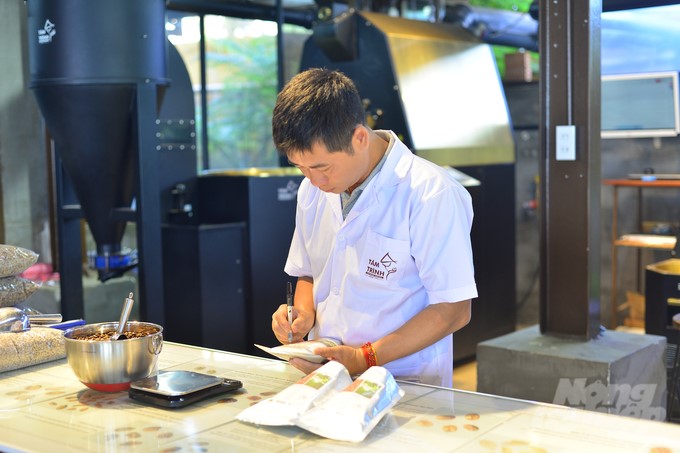
Tam Trinh Coffee has been granted Rainforest Alliance (RA) certification for sustainable coffee production. Photo: Minh Hau.
The coffee pre-processing process is carried out by three methods, including: natural drying; wet pre-processing by peeling the flesh, then drying the bean; and pre-processing honey by soaking the coffee beans after peeling the flesh for 48 hours to ferment, then washing and drying.
"After being pre-processed, coffee will be dried on a high frame in the greenhouse. Initially, coffee is dried in thin layers and then gradually gathered into thicker layers. This drying technique helps coffee beans stay clean and ensures quality during the drying process," Mr. Mai Ngoc Dinh shared.
After passing a thorough quality inspection process, coffee will be roasted. Coffee roasting is an important process that determines the flavor, aroma, strength, and aftertaste.
With exquisite roasting techniques learned from experts in the coffee industry, the coffee roasting process at Tam Trinh Coffee is implemented by advanced roasting machines controlled by computers throughout the roasting process to help coffee beans have a charming, sweet aroma. Once roasted, coffee is transferred into sealed containers and stored for about 10 days to continue to reach maximum flavor.
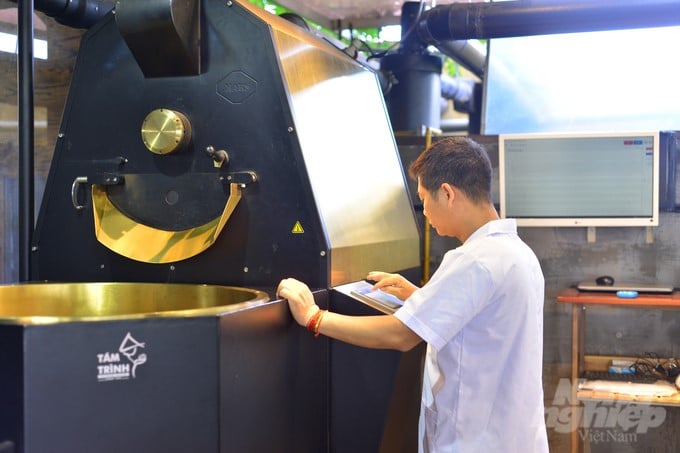
The coffee roasting process is carried out according to the most optimal roasting formulas to help develop the full flavor of the coffee beans. Photo: Minh Hau.
Currently, Tam Trinh Coffee has linked with more than 3,000 coffee farmer households to build and develop a sustainable coffee model throughout Lam Dong province. Of which, Robusta coffee accounts for the majority of the area, grown mainly in Lam Ha, Di Linh districts, and Bao Loc city; Arabica coffee is grown mainly in Lac Duong and Cau Dat districts.
Each year, Tam Trinh Coffee supplies more than 30,000 tons of its high-quality coffee products to the market. Products are provided to partners such as Nestlé, The Coffee House, etc. and exported to European countries, America, Japan, the Philippines, etc.
In the coming time, Tam Trinh Coffee will continue to expand its high-quality coffee model to improve quality and output, meet domestic and international consumption needs, and contribute to enhancing the value of Vietnamese coffee in international markets. Currently, the Tam Trinh coffee brand has been certified for production according to the sustainable standards of global organizations such as 4C, UTZ, and the Rainforest Alliance (RA).
Translated by Huyen Vu Thu

(VAN) A cutting-edge farming technique being implemented on an experimental ranch in Arizona's Sonoran Desert has already saved a billion gallons of water over five years, according to Civil Eats.

(VAN) Poultry and pig production and the environment can be boosted through enhanced water technology, according to new research.
![Turning wind and rain into action: [4] Bringing climate bulletins to remote and isolated areas](https://t.ex-cdn.com/nongnghiepmoitruong.vn/608w/files/linhnhp/2025/06/14/1152-z6704423696987_15fd32ffc26d590d204d520c9dac6786-nongnghiep-151141.jpg)
(VAN) The Vietnam Agriculture and Nature Newspaper interviewed Mr. Vu Thai Truong, Acting Head of Climate Change and Environment at UNDP Vietnam, to gain deeper insight into how climate bulletins are delivered to farmers.

(VAN) In Tien Giang, a high-tech shrimp farm has developed a distinctive energy-saving farming model that has yielded promising results.
![Turning wind and rain into action: [3] 300.000 farmers benefit from agro-climatic bulletins](https://t.ex-cdn.com/nongnghiepmoitruong.vn/608w/files/news/2025/06/12/e5a48259d6a262fc3bb3-nongnghiep-125122.jpg)
(VAN) The agro-climatic bulletin has become a valuable tool for farmers in the Mekong Delta. After more than five years of implementation, the initiative is gradually being expanded nationwide.
![Turning wind and rain into action: [2] Providing forecasts to the people](https://t.ex-cdn.com/nongnghiepmoitruong.vn/608w/files/news/2025/06/12/e5a48259d6a262fc3bb3-nongnghiep-103927.jpg)
(VAN) In addition to improving the quality of hydrometeorological forecasts, putting forecast bulletins into practical use is crucial for production and disaster prevention.

(VAN) Blue carbon is receiving attention for its rapid absorption capacity and vast potential. It represents a promising nature-based solution to respond to climate change.